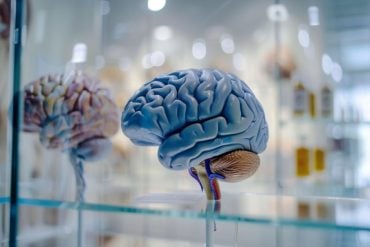Summary: Sports participation is associated with increased hippocampal volume in children. For boys, the change of hippocampal volume was linked to a reduction of depressive symptoms. Findings suggest participating in sporting activities could help to reduce depression in adolescent males.
Source: Elsevier
Participation in team sports is associated with fewer depressive symptoms in children, whereas non-sport activities have no association with symptoms, according to a study in Biological Psychiatry: Cognitive Neuroscience and Neuroimaging. The association was found only for boys. The findings suggest that exercise could have anti-depressant effects in adolescents.
“These interesting results provide important clues as to how exercise benefits mood in children and reveals the important role that gender plays in these effects,” said Cameron Carter, MD, Editor of Biological Psychiatry: Cognitive Neuroscience and Neuroimaging.
Using brain imaging, the researchers showed that involvement in sports was associated with increased volume of a brain region important for memory and response to stress–the hippocampus–in both boys and girls. However, hippocampal volume was associated with depressive symptoms in boys only, suggesting that in boys, hippocampal changes may play a role in the relationship between sports involvement and depressive symptoms.
The positive impact of exercise on depression and the link with hippocampal volume has been shown previously in adults. But the new study, which included over 4,000 children ages 9-to-11 years, is the first to connect involvement in sports with mental health and brain development in children.
“We found that these relationships were specific to participating in sports, and not to participating in other types of activities, such as clubs, arts and music, though these activities may have their own benefits that were not examined in the current study,” said first author Lisa Gorham and senior author Deanna Barch, PhD, both of Washington University in St. Louis, MO, USA. “We also found that these relationships were particularly strong for participating in team sports or sports that involved ‘structure’, such as a school team, a non-school league or regular lessons, as compared to more informal engagement in sports. This raises the intriguing possibility that there is some added benefit of the team or structured component of sports, such as the social interaction or the regularity that these activities provide.”

The data do not show which one causes the other–whether participating in sports leads to the effects on brain development and depression, or if children with those characteristics are less likely to engage in sports. “However, either of these causal relations is important and would suggest new directions for work on improving or preventing depression in children,” said Ms. Gorham and Dr. Barch.
The findings provide an important look at how exercise might impact brain development in adolescence and suggest a way of reducing or preventing depression. Confirming the impact of sports on brain development and mood would provide strong support for encouraging children to participate in structured sports that provide both exercise and social interaction.
Source:
Elsevier
Media Contacts:
Rhiannon Bugno – Elsevier
Image Source:
The image is in the public domain.
Original Research: Closed access
“Involvement in Sports, Hippocampal Volume, and Depressive Symptoms in Children”Jim Hudziak, Deanna M. Barch. Biological Psychiatry: Cognitive Neuroscience and Neuroimaging
Available online 4 February 2019 doi:10.1016/j.bpsc.2019.01.011
Abstract
Involvement in Sports, Hippocampal Volume, and Depressive Symptoms in Children
Background
Recent studies have found that higher levels of exercise are associated with fewer symptoms of depression among young people. In addition, research suggests that exercise may modify hippocampal volume, a brain region that has been found to show reduced volume in depression. However, it is not clear whether this relationship emerges as early as preadolescence.
Methods
We examined data from a nationwide sample of 4191 children 9 to 11 years of age from the Adolescent Brain and Cognitive Development Study. The parents of the children completed the Child Behavior Checklist, providing data about the child’s depressive symptoms, and the Sports and Activities Questionnaire, which provided data about the child’s participation in 23 sports. Children also took part in a structural magnetic resonance imaging scan, providing us with measures of bilateral hippocampal volume.
Results
Sports involvement interacted with sex to predict depressive symptoms, with a negative relationship found in boys only (t = −5.257, β = −.115, p < .001). Sports involvement was positively correlated with hippocampal volume in both boys and girls (t = 2.810, β = .035, p = .007). Hippocampal volume also interacted with sex to predict depressive symptoms, with a negative relationship in boys (t = −2.562, β = −.070, p = .010), and served as a partial mediator for the relationship between involvement in sports and depressive symptoms in boys.
Conclusions
These findings help illuminate a potential neural mechanism for the impact of exercise on the developing brain, and the differential effects in boys versus girls mirror findings in the animal literature. More research is needed to understand the causal relationships between these constructs.







